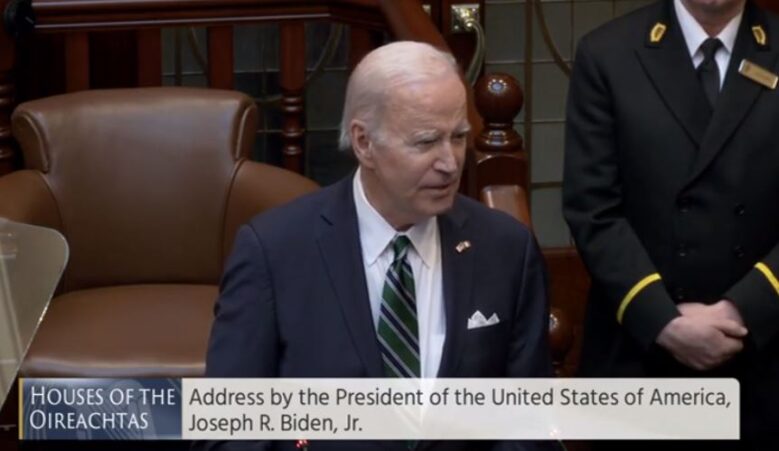When President Joe Biden addressed the Joint Houses of the Oireachtas yesterday, he mentioned the word ‘dignity’ no fewer than seven times, asking the assembled politicians to “Name me another country, in whatever their language is, that use the word ‘dignity’ as much as we Irish use the word ‘dignity’.”
In fact, what he did not say, but could have, is that the Irish Constitution was the first in the world, back in 1937, to explicitly mention that word, largely because it is a product of Catholic social teaching.
Three presidents before Biden addressed the Oireachtas, namely John F Kennedy, Ronald Reagan and Bill Clinton, and both Reagan and Clinton invoked the concept of dignity.
There was no mention of the religion roots of this concept in Biden’s speech.
But in 1984, Reagan explicitly linked dignity to Christianity, saying that Ireland “gave the world the saints and scholars who preserved Western culture, the missionaries and soldiers who spoke of human dignity and freedom and put much of the spark to my own country’s quest for independence, and that of other nations.”
Bill Clinton, in his address to the Oireachtas in 1995, mentioned dignity in connection with our God-given abilities. He said: “We want for all of your children the right to grow up in an Ireland where this entire island gives every man and woman the right to live up to the fullest of their God-given abilities and gives people the right to live in equality, freedom and dignity.”
In his speech in Leinster House in 1963, John F Kennedy said: “No larger nation did more to keep Christianity and Western culture alive in their darkest centuries.”
While some countries introduced the concept of human dignity into their Constitution after the horrors of the Second World War, Ireland was the first to do so in 1937.
In invoking the Trinity, the Preamble proclaims that the Irish people adopt Bunreacht na hÉireann “so that the dignity and freedom of the individual may be assured”.
Samuel Moyn, Professor of History at Yale University, who has studied the drafting of this important document, maintains that the insertion of the notion of dignity was inspired by Pope Pius XI and his encyclical letter Divini Redemptoris issued in the same weeks when the Preamble to the Constitution was written. (Prof. Moyn is not Catholic and is not defending a partisan view)
A previous draft of the Preamble mentioned not the “dignity and freedom of the individual” but “of the citizens”. Moyn notes that this is “an important revision since to restrict dignity to “citizens” might seem to ignore its natural foundations and thus its role in constraining the state.”
The concept of the dignity of the individual was promoted in the social teaching of the Church to defend the natural rights of human beings from the undue interference of the state. In March 1937, when the Preamble was written, Pope Pius XI wrote two encyclicals against the totalitarian state: Divini Redemptoris, against Communism, and Mit Brennender Sorge, in which he denounced Nazism because it “violates every human right and dignity”.
Soon after the World War II, the United Nations issued the Universal Declaration of Human Rights that mentions dignity twice in its preamble, then in its first article (“All human beings are born free and equal in dignity and rights”), and two more times later. The French philosopher Jacques Maritain, a Catholic convert, had a central role in the drafting of the Declaration. (See more here.)
The ultimate basis for human dignity is, of course, the belief that we are all made in the Image and Likeness of God, and are not chance products of a blind universe. Catholic social teaching says that dignity begins at conception and does not end until natural death.
It is a pity that Joe Biden, a practicing Catholic, no longer believes that the concept of dignity begins in the womb. On the contrary, as his career has progressed, his support for the unborn has waned to the point of total non-existence.
















